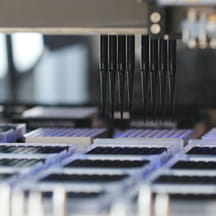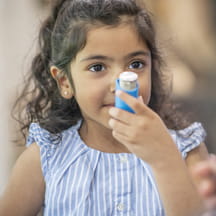A diagnosis of Niemann Pick Type C1 (NPC1) is rare, and until recently, considered fatal. NPC1 is referred to as childhood Alzheimer's, an inherited neurological disease affecting all cells of the body causing a progressive decline in neurological and cognitive functions. Pam and Chris Andrews learned of their daughters' diagnoses within days of each other. Belle was 5, and they had many doctor visits and tests to determine what was causing her physical and developmental delays.
After Belle's diagnosis, the doctor told the Andrews that 18-month old Abby needed to be tested. "Abby was fine," Pam says. "I wasn't processing what it meant that it was a genetic condition, and Abby was likely to have the same disease."
The Andrews quickly moved into fight mode. They traveled from Texas to Chicago to take part in a clinical trial for the gene therapy drug VTS-270. At Belle's first appointment, the doctors asked if they wanted Abby to start the therapy. "We did not hesitate to say yes," Pam says. "We were witnessing our older daughter lose the ability to walk and to talk. She was slipping through our fingers." Abby qualified for compassionate use therapy and was the youngest person in the world to receive the drug. While the Andrews didn't think Abby was delayed, her development increased within weeks of starting treatment.
Making it local
It took only a few weeks of traveling to Chicago and meeting other clinical trial families who also traveled from Texas before Pam began to question in her blog why they had to get treatment so far away from home. When leaders at Dell Children's Medical Center of Central Texas in Austin became aware of the Andrews' situation, they stepped in to help and offer the treatment.
Deb Brown, chief operating officer at Dell Children's, says the hospital is focused on keeping Austin and Central Texas children at home. "The hospital's decision to participate in the clinical trial was an easy one—to have to travel from your home where your support system surrounds you during your most vulnerable time is a decision no parent should have to make," Brown says.
Abby, now 5, continues to receive treatment twice a month and exhibits no visible signs of the condition. Belle, now 10, has been receiving treatment every other week for the last three years. Her swallowing is back to baseline, her maturity is age appropriate, and she's more engaged academically. "She can learn how to do math and to read, and that's a miracle," Chris says. "The fact that she can learn anything new—that's amazing because it's not the natural trajectory of the disease."
Difficult conversations
Pam says while Abby can't articulate her thoughts, she understands she and her sister have the same condition. "Belle understands too," Pam says. "Belle is happy her younger sister does not have the same progression of the condition." Belle is proud that Abby can do dance and gymnastics, and she's thrilled Abby could be treated earlier than she was.
Hospital staff are working with the couple to help the girls understand what they're going through. The Andrews say everyone at the hospital is part of their support network and it begins the moment they check in. "It might as well be another room in our house," Pam says. "We walk in and feel right at home."
Dell Children's has provided treatment for seven NPC1 children. James Gibson, M.D., says a combination of factors allows Dell Children's to provide the clinical trial for individuals who do not have a local treatment site. "We have an easily accessible airport and a treatment team that can ramp-up overnight to initiate this therapy."


